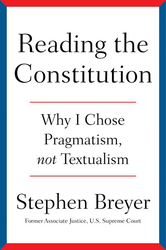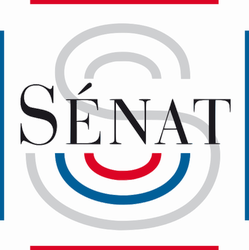Thesaurus : Doctrine
Référence générale, Cohendet, M.-A. et Fleury, M., Droit constitutionnel et droit international de l'environnement, Revue française de droit constitutionnel , PUF, » 2020/2, n°122, p.271-297.
___
Résumé de l'article :
Thesaurus : Doctrine

► Référence complète : S. Mouton, "Dimensions constitutionnelles de l'Obligation de Compliance", in M.-A. Frison-Roche (dir.), L'obligation de Compliance, Journal of Regulation & Compliance (JoRC) et Dalloz, coll. "Régulations & Compliance", 2024
____
📕lire une présentation générale de l'ouvrage, L'obligation de Compliance, dans lequel cet article est publié
________
March 26, 2024
Thesaurus : Doctrine

► Full reference : S.Breyer, Reading the Constitution: Why I Chose Pragmatism, Not Textualism, Simon & Schuster, 2024, 361 p.
____
📗read the 4th cover page
____
📗read the book's table of contents
____
► Book summary (by the publisher) : "A provocative, brilliant analysis by recently retired Supreme Court Justice Stephen Breyer that deconstructs the textualist philosophy of the current Supreme Court’s supermajority and makes the case for a better way to interpret the Constitution.
“You will not read a more important legal work this election year.” —Bob Woodward, Washington Post reporter and author of fifteen New York Times bestselling books
“A dissent for the ages.” —The Washington Post
“Breyer’s candor about the state of the court is refreshing and much needed.” —The Boston Globe
The relatively new judicial philosophy of textualism dominates the Supreme Court. Textualists claim that the right way to interpret the Constitution and statutes is to read the text carefully and examine the language as it was understood at the time the documents were written.
This, however, is not Justice Breyer’s philosophy nor has it been the traditional way to interpret the Constitution since the time of Chief Justice John Marshall. Justice Breyer recalls Marshall’s exhortation that the Constitution must be a workable set of principles to be interpreted by subsequent generations.
Most important in interpreting law, says Breyer, is to understand the purposes of statutes as well as the consequences of deciding a case one way or another. He illustrates these principles by examining some of the most important cases in the nation’s history, among them the Dobbs and Bruen decisions from 2022 that he argues were wrongly decided and have led to harmful results."
________
Sept. 27, 2022
Hearings by a Committee or Public organisation

🌐suivre Marie-Anne Frison-Roche sur LinkedIn
🌐s'abonner à la Newsletter MAFR Regulation, Compliance, Law
____
► Référence complète : M.-A. Frison-Roche, audition par la Commission des Lois du Sénat sur la Proposition de Loi constitutionnelle relative à l'interruption volontaire de grossesse et à la contraception, 27 septembre 2022.
____
► Lire le dossier législatif, notamment l'exposé des motifs de la proposition de loi.
____
►Résumé de la présentation avant la discussion : ma contribution à la discussion nourrie et très large établie entre les représentants du Sénat et les administratrices et mes collègues, Elisabeth Zoller, Stéphane Mouton et Sophie Paricard, a plutôt consisté à développer la dimension concrète et pratique du sujet et la considération que celle-ci a sur la rédaction d'un texte, s'il venait à l'idée du Législateur de s'en saisir.
En effet, il s'agit non pas tant d'établir un droit subjectif, dont la dimension constitutionnelle en tant que telle peut poser techniquement problème, mais d'assurer son effectivité. Ce terme-même d'effectivité est utilisé par la proposition de loi. Or, la notion d'effectivité est utilisée dans le Droit économique, qui vise les buts, le Droit de la Régulation et de la Compliance visant à obtenir dans une sorte de réussite croissante l'effectivité, l'efficacité et l'efficience des mécanismes juridiques. Mais ce souci de politique publique est difficile à intégrer dans le système juridique, et ce que fait le Droit de la Régulation et de la Compliance est difficile à concevoir au niveau constitutionnel, la notion d' "accès à un droit" étant sans doute un pléonasme par rapport à la notion de "droit à l'effectivité", lequel vise sans doute les différents sujets de droit qui, dans la chaîne concrète qui jalonne la façon dont une femme dispose de son corps, deviendrait débiteurs d'un tel "droit d'accès à un droit".
Une telle notion peut engendrer de nombreux contentieux car les potentiels débiteurs d'un tel droit subjectif, qui aurait valeur constitutionnelle, ont aussi des droits subjectifs à opposer, et c'est une grande agressivité juridictionnelle des uns et des autres, des uns contre les autres, qui peut être ainsi engendrée.
D'ailleurs, placer dans la Constitution un tel droit subjectif sous "De l'autorité judiciaire" est inapproprié car le droit à l'avortement est protégé également par le juge administratif, non seulement à travers le contrôle objectif des textes mais encore à travers le contentieux subjectif, les établissements publics étant fortement impliqués dans sa mise en oeuvre.
En outre, de la même façon que l'arrêt Dobbs v. Jackson est un arrêt systémique, visant le fédéralisme, qui en application de la conception par la Cour de celui-ci peut et va priver d'autres droits subjectifs de leur protection constitutionnelle fédérale, le premier à tomber étant sans doute le droit des personnes de même sexe à se marier, mais d'autres peuvent venir, le Constituant français devrait d'ores et déjà (puisqu'il vise l'avenir) soit :
- viser une catégorie plus abstraite de droits subjectifs que le droit à l'avortement, en visant une catégorie . Mais comment délimiter cette catégorie ? comment le dire ?
- soit partir dans le système de liste (ce qui explique l'insertion dans l'article 16, qui met ce droit spécifique à l'avortement parmi une liste d'autres droits, et suppose donc qu'à chaque fois l'on prenne une autre loi pour mettre les autres ...
Cela suppose alors que le Législateur intervenir par à-coup, dans une liste que le juge aura bien du mal à interpréter, sans doute une "liste fermée"..., mais surtout intervienne en Ex-Post, à chaque fois qu'il pense qu'une agression est davantage probable sur un droit que sur un autre (car c'est le raisonnement ici suivi, l'arrêt Dobbs, qui ne concerne pas l'Europe, étant considéré par le Législateur français comme un "signal" de danger sur ce droit-là...) : mais le Législateur d'une part doit intervenir sur l'avenir et non pas sur le passé (les lois "en réaction" ne sont pas de bonne méthode) et doit être abstraites car c'est au juge de décliner sur des situations et droits particuliers (cf. Carbonnier et "l'effet macédonier"). Or, le Conseil constitutionnel n'est pas placé pour faire cela. Quel juge en France pourrait le faire ?
Malgré la bonne intention du Législateur, et en retournant les techniques juridiques dans tous les sens, l'on ne voit pas "quoi faire"...
Mais, puisque l'enjeu n'est pas tant l'existence d'un droit, mais l'effectivité de celui-ci, et l'efficacité d'un système médical et social à le servir dans la "réalité" des choses, pourquoi ne pas se tourner vers le Droit économique, Droit concret et téléologique par excellence ?
Dès lors, si le Législateur devait intervenir pour protéger davantage à l'avenir l'effectivité du droit des femmes à disposer de leur corps, c'est peut-être sous une forme plus incitative, en s'appuyant sur les entreprises qui, comme l'ont fait les entreprises américaines en aidant les femmes à voyager jusqu'aux Etats protecteurs, en ne communiquant pas des informations aux autorités publiques des Etats non-protecteurs, aident concrètement à l'effectivité des droits subjectifs qui sont concrètement menacés, maintenant aux Etats-Unis, éventuellement demain en Europe et en France.
Cela s'appuie sur le Droit de la Compliance.
____
Voir aussi
💬Frison-Roche, M.-A, "La Cour suprême a déclenché la bombe de la sécession. Que faire ?", 5 juillet 2022
💬Frison-Roche, M.-A, Droit à l’avortement : « Le processus de sécession est dans la décision », 27 juin 2022
📧M.-A. Frison-Roche, Seuls les droits subjectifs techniques ne sont pas touchés par l'arrêt Dobbs: c'est sur eux qu'il faut construire une nouvelle théorie de l'entreprise, 29 juin 2022
Jan. 20, 2022
Thesaurus : Doctrine
Jan. 18, 2022
Thesaurus : Doctrine
► Référence complète : A. Mbengue, "L’amicus curiae devant la Cour suprême des États-Unis", La Revue des Droits de l'Homme, in dossier "Les interprétations concurrentes de la Constitution, III- Interprétations concurrentes et observateurs, janvier 2022, n°21, pp. 1-14
____
► Résumé de l'article (fait par l'auteure) : "L’amicus curiae permet l’intervention des entités défendant des intérêts privés dans le contrôle de constitutionnalité opéré par la Cour suprême des États-Unis. La figure moderne de l’amicus curiae a créé une concurrence entre un intérêt public tel qu’il est conçu par les entités privées avec l’intérêt public tel qu’il est défendu par les organes gouvernementaux. Cela a conduit le juge constitutionnel américain à objectiver les données comprises dans les mémoires des personnes privées dans son interprétation de la Constitution par des méthodes d’appropriation des interprétations concurrentes. Cette appropriation met donc fin à la conception monopolistique de défense de l’intérêt public par les organes gouvernementaux et érige les entités privées comme des experts factuels des questions constitutionnelles. Ainsi, davantage qu’il est un élément procédural, l’amicus curiae est porteur d’une logique politique éminente dans le contrôle de constitutionnalité aux États-Unis.".
____
🦉Cet article est accessible en texte intégral pour les personnes inscrites aux enseignements de la Professeure Marie-Anne Frison-Roche
________
Aug. 30, 2021
Compliance: at the moment

► An article from March 3, 2021, Smile for the camera: the dark side of China's emotion-recognition tech, then an article from June 16, 2021, "Every smile you fake" - an AI emotion - recognition system can assess how "happy" China's workers are in the office describes how a new technology of emotional recognition is able, through what will soon be out of fashion to call "facial recognition", to distinguish a smile that reflects a mind state of real satisfaction from a smile which does not correspond to it. This allows the employer to measure the suitability of the human being for his or her work. It is promised that it will be used in an ethical way, to improve well-being at work. But isn't it in itself that this technology is incompatible with any compensation through ethical support?
The technology developed by a Chinese technology company and acquired by other Chinese companies with many employees, allows to have information on the actual state of mind of the person through and beyond his or her facial expressions and bodily behavior.
Previously, the technology of emotional recognition had been developed to ensure security, by fighting against people with hostile plans, public authorities using it for example in the controls at airports to detect the criminal plans which some passengers could have.
It is now affirmed that it is not about fighting against some evil people ("dangerousness") to protect the group before the act is committed ("social defense”) but that it is about helping all workers.
Indeed, the use that will be made of it will be ethical, because first the people who work for these Chinese companies with global activity, like Huawaï, do it freely and have accepted the operation of these artificial intelligence tools (which is not the case with people who travel, control being then a kind of necessary evil that they do not have to accept, which is imposed on them for the protection of the group), but even and above all, the purpose is itself ethical: if it turns out that the person does not feel well at work, that they are not happy there, even before they are perhaps aware, the company can assist.
Let’s take this practical case from the perspective of Law and let’s imagine that it is contested before a judge applying the principles of Western Law.
Would this be acceptable?
No, and for three reasons.
1. An "ethical use" cannot justify an unethical process in itself
2. The first freedoms are negative
3. "Consent" should not be the only principle governing the technological and digital space
I. AN "ETHICAL USE" CAN NEVER LEGITIMATE AN UNETHICAL PROCESS IN ITSELF
These unethical processes in themselves cannot be made "acceptable" by an "ethical use" which will be made of them.
This principle was especially reminded by Sylviane Agacinski in bioethics: if one cannot dispose of another through a disposition of his or her body which makes his or her very person available (see not. Agacinski, S., ➡️📗Le tiers-corps. Réflexions sur le don d’organes, 2018).
Except to make the person reduced to the thing that his or her body is, which is not ethically admissible in itself, that is excluded, and Law is there in order to this is not possible.
This is even why the legal notion of "person", which is not a notion that goes without saying, which is a notion built by Western thought, acts as a bulwark so that human beings cannot be fully available to others, for example by placing their bodies on the market (see Frison-Roche, M.-A., ➡️📝To protect human beings, the ethical imperative of the legal notion of person, 2018). This is why, for example, as Sylviane Agacinski emphasizes, there is no ethical slavery (a slave who cannot be beaten, who must be well fed, etc.).
That the human being agrees ("and what about if it pleases me to be beaten?") does not change anything.
II. THE FIRST FREEDOM IS THE ONE TO SAY NO, FOR EXAMPLE BY REFUSING TO REVEAL YOUR EMOTIONS: FOR EXAMPLE HIDING IF YOU ARE HAPPY OR NOT TO WORK
The first freedom is not positive (being free to say Yes); it is negative (being free to say No). For example, the freedom of marriage is having the freedom not to marry before having the freedom to marry: if one does not have the freedom not to marry, then the freedom to marry loses any value. Likewise, the freedom to contract implies the freedom not to contract, etc.
Thus, freedom in the company can take the form of freedom of speech, which allows people, according to procedures established by Law, to express their emotions, for example their anger or their disapproval, through the strike.
But this freedom of speech, which is a positive freedom, has no value unless the worker has the fundamental freedom not to express his or her emotions. For example if he or she is not happy with his or her job, because he or she does not appreciate what he or she does, or he or she does not like the place where he or she works, or he or she does not like people with whom he or she works, his or her freedom of speech demands that he or she have the right not to express it.
If the employer has a tool that allows him or her to obtain information about what the worker likes and dislikes, then the employee loses this first freedom.
In the Western legal order, we must be able to consider that it is at the constitutional level that the infringement is carried out through Law of Persons (on the intimacy between the Law of Persons and the Constitutional Law, see Marais , A., ➡️📕Le Droit des personnes, 2021).
III. CONSENT SHOULD NOT BE THE ONLY PRINCIPLE GOVERNING THE TECHNOLOGICAL AND DIGITAL SPACE
We could consider that the case of the company is different from the case of the controls operated by the State for the monitoring of airports, because in the first case observed people are consenting.
"Consent" is today the central notion, often presented as the future of what everyone wants: the "regulation" of technology, especially when it takes the form of algorithms ("artificial intelligence"), especially in digital space.
"Consent" would allow "ethical use" and could establish the whole (on these issues, see Frison-Roche, M.-A., ➡️📝Having a good behavior in the digital space, 2019).
"Consent" is a notion from which Law is today moving away in Law of Persons, in particular as regards the "consent" given by adolescents on the availability of their body, but not yet on digital.
No doubt because in Contract Law, "consent" is almost synonymous with "free will", whereas they must be distinguished (see Frison-Roche, M.-A., ➡️📝Remarques sur la distinction entre la volonté et le consentement en Droit des contrats, 1995).
But we see through this case, which precisely takes place in China, that "consent" is in Law as elsewhere a sign of submission. It is only in a probative way that it can constitute proof of a free will; this proof must not turn into an irrebuttable presumption.
The Data Regulatory Authorities (for example in France the CNIL) seek to reconstitute this probative link between "consent" and "freedom to say No" so that technology does not allow by "mechanical consents", cut off from any connection with the principle of freedom which protects human beings, from dispossessing themselves (see Frison-Roche, M.-A., Yes to the principle of will, No to pure consents, 2018).
The more the notion of consent will be peripheral, the more human beings will be able to be active and protected.
________
June 3, 2021
Thesaurus : Doctrine
March 21, 2021
Compliance: at the moment

Feb. 17, 2021
Teachings : Banking and Financial Regulatory Law - Semester 2021

Résumé de la leçon : Après avoir vu précédemment les règles techniques qui gouvernent la sanction et la prévention des Abus de marché, il convient pour mieux comprendre les décisions et les conflits de revenir sur la tension permanente et peut-être définitive qui marque les principes et la place de la répression dans le Droit de la régulation bancaire et financière : dans le même temps qu'elle est un outil presque ordinaire de la Régulation, puisque la répression des abus de marché assure l'intégrité et le fonctionnement des marchés financiers, la répression ne peut et ne doit se soustraire à ce avec quoi elle entretient un lien de filiation : le Droit pénal. Dès lors et par exemple, alors qu'au premier titre, l' efficacité est son premier souci, au second titre, les droits de la défense et le souci des secrets demeurent, tandis que la nature régalienne du Droit pénal trace un cercle par nature national alors que la Régulation financière est au mieux mondiale, au moins européenne.
Il convient de reprendre cette question à travers une perspective plus générale, notamment à travers le Droit pénal et le Droit européen, tel que celui-ci a été précédemment présenté.
En effet, dans le même temps et parce qu'il s'agit de mécanismes qui ne peuvent pas faire sécession avec le système juridique, sa structure et ses fondements, l'on pourrait penser que la répression en matière bancaire et financière est une déclinaison du Droit pénal général, qu'elle en emprunte et en respecte les principes généraux, concevant des infractions spéciales pour les besoins qui lui sont propres. Ainsi, tout ce qui caractérise le Droit pénal, l'élément intentionnel de l'infraction, le caractère restrictif de l'interprétation des textes, le principe de la personnalité des délits et des peines, le système procédural indissociable des règles substantielles (comme les charges de preuve ou le principe non bis in idem) devrait s'appliquer dans des infractions générales qui concernent le secteur, comme l'escroquerie ou l'abus de confiance comme dans les infractions plus particulières, comme l'abus de biens sociaux, voire des infractions spécifique comme le blanchiment d'argent.
Mais et tout d'abord, par souci d' efficacité, le droit a tout d'abord développé un système de répression qui a emprunté d'autres méthodes, imprégnées avant tout du souci d' efficacité. En outre, le droit a organisé une sorte de double jeu répressif, par un droit administratif répressif à la disposition des régulateurs, qui prend assez souvent distance par rapport au droit pénal classique, lequel continue pourtant de s'exercer.
Les tensions ne peuvent qu'apparaître. A l'intérieur du Droit pénal , dont les principes sont assouplis alors que la rigidité du Droit pénal est dans sa nature même, dans l'articulation du Droit pénal avec le Droit administratif répressif, guidé par le service efficace de l'ordre public de marché, les Cours constitutionnelles tentant de garder un équilibre à l'ensemble.
Il faut sans doute prendre acte que contrairement aux principes classiques, le droit pénal financier n'est plus autonome du reste de la régulation , la répression devient objective, l' efficacité est son critère et ses objectifs sont systémiques. La loi dite "Sapin 2" le manifeste en internalisant tout le dispositif répressif dans les opérateurs eux-mêmes, devenant à la fois les assujettis et les agents d'effectivité de la Régulation.
-
Revenir aux bases avec le Dictionnaire bilingue du Droit de la Régulation et de la Compliance
-
Approfondir par la Bibliographie générale du Droit de la Régulation bancaire et financière
Revenir à la présentation générale du cours
Revenir au plan général du cours
Utilisez les matériaux ci-dessous pour aller plus loin et préparer votre conférence de méthode:

Updated: Dec. 24, 2020 (Initial publication: July 15, 2020)
Publications

This Working Paper has been the basis for the first conference of the two conferences in the colloquium in Toulouse (France) under the scientific direction of Lucien Rapp, about Les incitations, outils de la Compliance ("Incitations, as Compliance Tools"), on December 12, 2019, the first one about The sanction as incitation and the second one about Incitations and Compliance Law (synthesis of this colloquium).
Then, it has been the basis for the article, to be published in the books Les outils de la Compliance and Compliance Tools in the Series Régulations & Compliance.
Read a general presentation of this book.
Summary and Introduction of this Working Paper: At first glance, Compliance and Incentives appear to be totally opposite. For two major reasons. In the first place, because the sanctions have a central place in the Law of Compliance and the incentives suppose an absence of constraint on the operators. Secondly, because the incentives are linked to self-regulation and that Compliance Law assumes a strong presence of public authorities. Taking the first reason, one should choose: either Compliance or Incentives! Either the effectiveness of one or the effectiveness of the others; either the techniques of one or the techniques of others; either the philosophy of one or the philosophy of the others. Resign oneself to the loss that such a necessary choice would involve. But to put the terms thus amounts to think poorly about the situations and reduce the fields of the solutions which they call for. If we take a rich definition of Compliance Law, it is possible on the contrary to articulate Compliance and Incentives. From this perspective, sanctions can no longer become what blocks the use of incentives but, on the contrary, what constitutes them. Even more, the coupling between Incentives and the requirements of Compliance Law must be strongly encouraged, as soon as the public authorities supervise in Ex Ante all the initiatives taken by the "crucial operators".
This working document deals with the first issue
An honest observer can only feel immediately uneasy. Indeed, he can only raise the definition of the sanction as a "constraint" triggered Ex Post, at the very heart of Compliance Law which is presented as a set of Ex Ante mechanisms. Based on this contradiction in terms, should we give up the association and think that it would be wrong against the spirit to think of the sanction as an incentive?
It is undoubtedly in this connection that one perceives most clearly the clash of two cultures, which do not communicate, while technically they apply to the same situations. Indeed, because Compliance was firstly designed by Finance, everything is a tool for it. Therefore, the tendancy to think about the sanction only as an incentive is very strong in Compliance Law. It manifests itself continuously and will not stop (I). But whatever the reasons are to conceive it this way, the principles of the Rule of Law cannot disappear and if we do not want them to be erased, then they must be articulated (II). It’s an essential adjustment.
This is why we can literally say that Compliance has set Criminal Law on fire by its conception, logical but closed in on itself, of sanctions as simple incentives. For Law to remain, however, it is necessary to hold a very firm definition of Compliance Law centered on its Monumental Goal, which is the protection of the person.
La seconde problématique est analysée in "Compliance et Incitation : un couple à propulser", 2020.
Nov. 14, 2014
Thesaurus : 01. Conseil constitutionnel
La loi du 23 juin 1941 a restreint l'exportation des oeuvres d'art jusqu'à la loi du 31 décembre 1992. Pendant cette période, celles-ci n'ont donc pas relevé e pas de la seule liberté du commerce mais ont fait l'objet de restriction de circulation.
En effet, l'article 1ier de la loi obligeait à solliciter une autorisation de sortie du territoire de l'oeuvre d'article. Si celle-ci était refusée, l'article 2 donné à l'État français le pouvoir de "retenir" des oeuvres d'art au profit de collectivités publiques.
Cette disposition législative a été contestée par une QPC, la partie la prétendant contraire à l'article 17 de la Déclaration des droits de l'Homme et du Citoyen qui protège le droit de propriété privée.
Le Conseil d'État a rendu un arrêt le 8 septembre 2014 de transmission de cette QPC au Conseil constitutionnel.
Par la décision du 14 novembre 2014, QPC, M. Alain L., le Conseil constitutionnel considère en premier lieu que "la possibilité de refuser l'autorisation d'exportation assure la réalisation de l'objectif d'intérêt général de maintien sur le territoire national des objets présentant un intérêt national d'histoire ou d'art". Mais il ajoute immédiatement en second lieu que la privation de propriété "n'est pas nécessairement pour atteindre un tel objectif".
Le système consistant à imposer une acquisition forcée par une personne publique, alors que le dispositif pour empêcher l'oeuvre de sortir du territoire avait déjà fonctionné, instaure "une privation de propriété sans fixer les critères établissant une nécessité publique".
La disposition législative est donc contraire à la Constitution.
Sept. 29, 2011
Publications

► Référence complète : Frison-Roche, M.-A., QPC, autorités de concurrence, autorités de régulation économique et financière : perspectives institutionnelles, , in Roussille, M. (dir.), QPC et droit des affaires : premiers regards, n° spéc. des Petites Affiches, n° 194, 29 sept. 2011, pp.25-35.
____
____
Résumé de l'article : Les autorités de concurrence et de régulation économiques et financières vont être dans le mécanisme de la Question Prioritaire de Constitutionnalité confrontées à la Constitution principalement à propos des questions institutionnelles. Elles ont vocation à l’être à propos du droit d’action dans le lien que celui-ci entretient avec les droits de la défense. En effet, qu’il s’agisse du droit d’action d’origine, à travers l’auto-saisine, ou du droit d’action « à double détente » à travers le droit de recours et la présence de l’autorité dans l’instance de recours, cela constitue l’autorité comme juge et partie, situation contraire à la Constitution. En outre, l’impartialité est un principe constitutionnel autonome et les autorités doivent donner à voir leur impartialité objective. Malgré la séparation fonctionnelle de l’organisation interne, ce cumul des pouvoirs d’une partie et des pouvoir d’un juge n’est pas conforme à la Constitution et une QPC pourrait le relever. Une solution consisterait à créer des ministères publics ad hoc qui exerceraient les droits d’une partie objective, tandis que l’autorité exercerait le pouvoir de juger.
____
► Accéder à la conférence ayant servi de base à la rédaction de l'article.
____
► Lire une présentation plus détaillée de l'article ci-dessous ⤵
Updated: Feb. 1, 2007 (Initial publication: )
Thesaurus : Doctrine
► Référence complète : Goesel-Le Bihan, V., Le contrôle de proportionnalité exercé par le Conseil constitutionnel, in Dossier « Le contrôle de proportionnalité dans la jurisprudence du Conseil constitutionnel : figures récentes », Revue française de droit constitutionnel, 2007/2 (n° 70), p. 269-295.
____
May 15, 1991
Thesaurus : Doctrine
► Référence complète ; N. Zanon, "La polémique entre Hans Kelsen et Carl Schmitt sur la justice constitutionnelle", in Principe d'égalité et droit au suffrage, Annuaire international de justice constitutionnelle, 5-1989, 1991, pp.177-189.
____
________